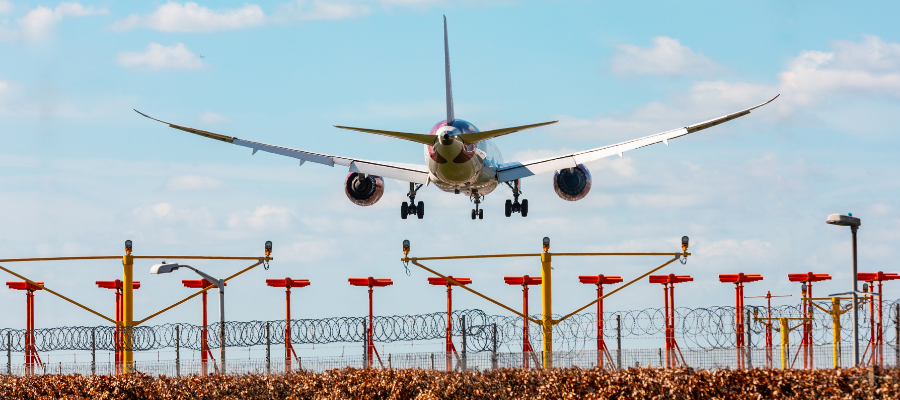🕒 Article read time: 2 minutes
Greener skies ahead: decarbonising the aviation sector

Heathrow is the UK’s largest port by value and the only hub airport, connecting businesses and passengers to over 200 destinations in 80 nations across the world. With 95% of the global economy within reach via a single flight from Heathrow, Heathrow’s logistics sector is critical to supporting businesses from across the UK trade globally.
Last year, Heathrow handled 1.4 million tonnes, or £2 billion worth of cargo, which included medicine, salmon and books. Heathrow continues to champion international trade, as exporting businesses support over 6.5 million jobs, including those within the logistics sector. However, the benefits of aviation cannot come at any cost; aviation must deliver for both the economy and the environment.
Heathrow has recently taken the ground-breaking step to incorporate sustainability into the airport’s financing, through a Sustainability Linked Bond (SLB) launched in July, which links to 2030 carbon reduction targets in the air and on the ground. Heathrow is also leveraging its procurement role to deliver a net zero supply chain, shifting airport vehicles to zero carbon and making sustainable improvements to infrastructure. In 2023, Heathrow became one of the first airports to trial lower carbon concrete, which reduces carbon emissions by 50% compared to conventional concrete.
ESSENTIAL DECARBONISATION
The aviation sector recognises that to protect the huge benefits of flying, it is essential to decarbonise aircraft emissions. Sustainable Aviation Fuel (SAF) is an alternative to traditional fossil-based aviation fuels, designed to reduce the environmental impact of aviation, delivering 70% lifecycle carbon reduction when compared to kerosene.
SAF can be made from a variety of sources, including waste, animal fat and cooking oil, and has the same chemical make-up as traditional kerosene. SAF can therefore be used as a drop-in with existing planes and infrastructure, replacing the need for fossil fuels. The technology is proven and already in use in commercial aircraft today, using what would otherwise be waste material.
SAF plays a pivotal role in achieving the UK's ambitious net zero emissions goals whilst protecting the huge economic benefits that aviation brings through trade and tourism. To increase the number of flights powered by SAF, Heathrow launched a world first in 2022 – an airport SAF incentive scheme to cover up to 50% of the premium cost of SAF, making the fuel more affordable for airlines to use.
INNOVATIVE PROGRAMME
Heathrow’s innovative Incentive Programme marks the next step in the airport’s plan for net zero flying. As a global SAF leader, Heathrow is committed to progressively increasing the SAF used each year, with the airport targeting 11% SAF usage by 2030.
This year alone the SAF incentive is expected to save approximately 81,000 tonnes of CO2. But the sector could move more quickly and cut carbon faster if government injected necessary pace into the expansion of SAF with supportive policy making. High costs and low production volumes mean SAF remains in short supply, with few able to access it at commercially viable rates.
The appetite to invest into SAF and to decarbonise aviation is there, but investors want certainty in longer-term domestic use before pouring in their capital. Government must act now to support a SAF industry for the UK, by introducing a price support mechanism and by acting on the commitment for at least five commercial-scale SAF plants to be in construction in the UK by 2025.
GOVERNMENT NEEDS TO MOVE QUICKLY
A price support mechanism – necessary due to the lack of price certainty for SAF – has helped develop a world-leading renewable energy industry with on and offshore wind in the UK, which is now cheaper than the alternatives and has brought huge economic benefits. The US and EU are surging forwards in the race to create new SAF industries, and the UK has all the natural advantages to be able to join them – but the UK government needs to move quickly. A price support mechanism would de-risk and incentivise investment in domestic SAF production facilities and would help mitigate the ‘green premium’ cost differential between traditional jet fuel and SAF.
The UK must be at the forefront of the global SAF race. A thriving SAF market in the UK and within Heathrow’s route network would be felt across the UK. A domestic SAF market could support 60,000 jobs across all UK regions and nations and be worth £10 billion in GVA benefits by 2050. If government implements the necessary policies, the many benefits of aviation – connectivity, trade, tourism, and investment – can be protected.
Published On: 21/12/2023 14:30:00

Comments Section
If you are a Logistics UK member login to add comments.